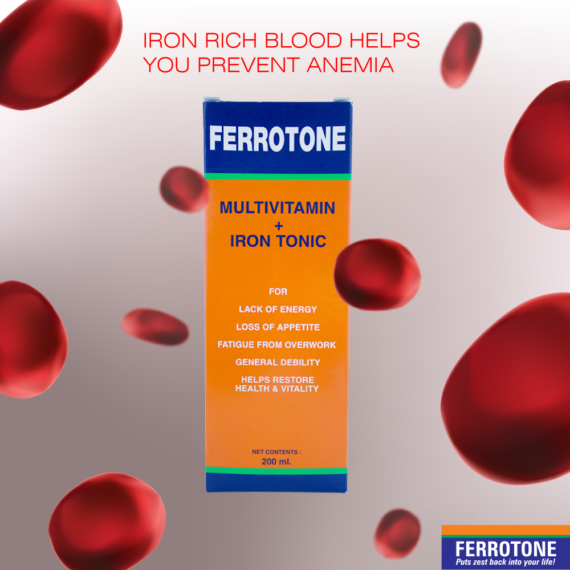Description

Dosage
Adults: Two 5ml teaspoons three times a day in divided doses after a meal.
Children: 5 to 12. One 5ml teaspoon three times a day in divided doses after a meal. Or as directed by a doctor.
Indications
- Iron contributes to normal formation of red blood cells
- Ideal source of iron for pregnancy, monthly cycle, athletes, 50+.
Store below 25°C in a dry place, out of sight and reach of children.
Food supplements must not replace a varied and balanced diet and a healthy lifestyle. As with other food supplements, consult your doctor or pharmacist before using if you are under medical supervision, pregnant, breast-feeding, have epilepsy, a thyroid disorder, haemochromatosis, suffer from food allergies, or are allergic to any of the ingredients. This product contains iron, which if taken in excess, may be harmful to very young children.
Vitamin B1 – Thiamine
The main functions of vitamin B1 are connected to its role as a helper molecule – and so-called ‘coenzyme’ – which activates enzymes, the proteins that control the biochemical processes occurring in the body. A sufficient intake of vitamin B1 is vital, as it plays an essential role in
- The production of energy from food
- The synthesis of nucleic acids
- The conduction of nerve impulses.
The European Food Safety Authority (EFSA), which provides scientific advice to policy makers, has confirmed that clear health benefits have been established for the dietary intake of vitamin B1 in contributing to:
- The normal function of the heart
- Normal carbohydrate and energy-yielding metabolism
- The normal function of the nervous system
- Normal neurological development and function
- Normal psychological functions.
Vitamin B1 (thiamin) deficiency is rare, but can occur in people who get most of their calorifies from sugar or alcohol. People with thiamin deficiency have difficulty digesting carbohydrates, causing a loss of mental alertness, difficulty in breathing and heart damage.
Vitamin B2 Ribolavine
A sufficient intake of vitamin B2 (riboflavin) is important as it helps the body to:
- Convert food (carbohydrates) into glucose to produce energy
- Neutralize ‘free radicals’ that can damage cells and DNA. This neutralizing ‘antioxidant’ effect may reduce or help prevent some of the damage contributing to the aging process, as well as the development of a number of health conditions like heart disease and cancer
- Convert vitamin B6 and vitamin B9 into active forms.
The European Food Safety Authority (EFSA), which provides scientific advice to assist policy makers, has confirmed that clear health benefits have been established for the dietary intake of vitamin B2 in contributing to:
- Normal energy-yielding metabolism
- Normal metabolism of iron in the body
- The maintenance of normal skin and mucous membranes
- The maintenance of normal red blood cells
- The maintenance of normal vision
- The protection of cell constituents from oxidative damage
- The maintenance of the normal function of the nervous system
- The reduction of tiredness and fatigue.
Individuals who have inadequate food intake are at risk of vitamin B2 deficiency, particularly children from low socio-economic backgrounds, elderly people with poor diets, chronic ‘dieters’ and people who choose to exclude milk products from their diet (vegans).
Symptoms of riboflavin deficiency include fatigue, slowed growth, digestive problems, cracks and sores around the corners of the mouth, swollen magenta tongue, eye fatigue, and swelling and soreness of the throat.
Vitamin B3 (Niacin)
- Convert food into glucose, used to produce energy
- Produce macromolecules, including fatty acids and cholesterol
- Facilitate DNA repair and stress responses.
The European Food Safety Authority (EFSA), which provides scientific advice to policy makers, has confirmed that clear health benefits have been established for the dietary intake of niacin (vitamin B3) in contributing to:
- Normal energy-yielding metabolism
- The normal function of the nervous system
- The maintenance of normal skin and mucous membranes
- Normal psychological functions
- The reduction of tiredness and fatigue.
In developed countries, where vitamin B3 deficiency is rare, alcoholism is the prime cause of deficiency. Symptoms of mild deficiency include indigestion, fatigue, canker sores, vomiting, and depression.
Vitamin B6 Pyrodixine
An adequate intake of vitamin B6 (pyridoxine) is essential as it helps the body to:
- Convert food into glucose, which is used to produce energy
- Make neurotransmitters, which carry signals from one nerve cell to another
- Produce hormones, red blood cells, and cells of the immune system
- Control (along with vitamin B12 and vitamin B9) blood levels of homocysteine – an amino acid that may be associated with heart disease.
The European Food Safety Authority (EFSA), which provides scientific advice to assist policy makers, has confirmed that clear health benefits have been established for the dietary intake of vitamin B6 in contributing to:
- Normal protein and glycogen metabolism
- The normal function of the nervous system
- Normal red blood cell formation
- The normal functioning of the immune system
- The regulation of hormonal activity
- Normal homocysteine metabolism
- Normal energy-yielding metabolism
- Normal cysteine synthesis
- Normal psychological functions
- The reduction of tiredness and fatigue.
A deficiency of vitamin B6 alone is uncommon as any deficiency typically occurs in combination with a deficit in other B-complex vitamins (especially vitamin B2).
Population groups at risk of vitamin B6 deficiency are pregnant and breast-feeding women (additional demands), women taking oral contraceptives, the elderly (due to lower food intake), underweight people, chronic alcoholics, and people with a high protein intake.
Symptoms of deficiency include nervous system disorders (irritability, depression, and confusion), impairment of the immune system and inflammation of skin and mucosa.
Manganese
Manganese is a mineral that is found in several foods including nuts, legumes, seeds, tea, whole grains, and leafy green vegetables. It is considered an essential nutrient because the body requires it to function properly.
It may play a role in the following :
- Manganese has also exhibited efficiency in controlling the level of sugar in the human blood
- Regulation of the body’s metabolism is one of the vital functions of manganese.
- Possibly Alleviates PMS Syndrome
- Improves Digestion
Calcium
Calcium plays a very important role in the body. It is necessary for normal functioning of nerves, cells, muscle, and bone. If there is not enough calcium in the blood, then the body will take calcium from bones, thereby weakening bones. Having the right amount of calcium is important for building and keeping strong bones.





















Andrea Williams –
I would recommend anyone to this multivitamins since I have seen a vast improvement in my health. Tiredness no longer exists so it really works